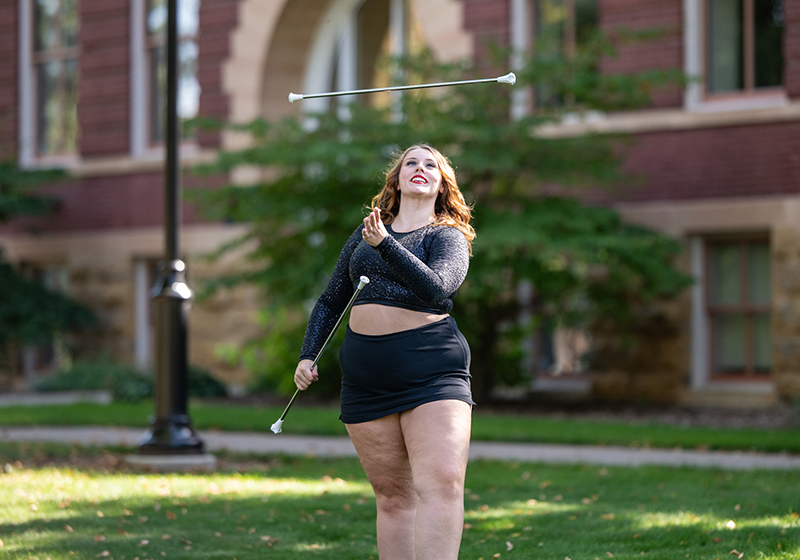
Legally blind majorette keeps marching, twirling and tossing

Legally blind majorette keeps marching, twirling and tossing
Oct. 9, 2025 – Evey Nicpon of Rice Lake started twirling a baton as a majorette when she was in fourth grade. Now a first year animal science pre-vet major at the University of Wisconsin-River Falls, she performs with the Marching Falcons marching band. But she says there was a time she thought that could never happen.
“When I was 12 or 13, I found out I had a rare genetic condition, causing me to lose my vision,” Nicpon said. “When you find out you’re going to go blind, it’s scary. It’s intimidating.”
At first, Nicpon stopped doing many of the things she loved, including majorettes, drawing and painting. Fortunately for the Marching Falcons, Nicpon had a change of heart.
“Over time, I realized the world didn’t stop when I lost my vision and the only way for me to get to any of my goals in life was to really push past that,” Nicpon said.
She went back to majorettes and started creating and selling art again, though her vision continued to deteriorate. She now can see just a few feet in front of her. She can see larger objects, but not smaller objects or faces. During the day, details are especially fuzzy. She is also color blind and lacks depth perception.
So how does Nicpon toss and catch a baton? Timing is key. She choreographs her own routines and counts along as she performs each move. She knows what count the baton will come down on. But with impaired vision, that precision takes extra work.
“I go to practice, and then I go home, and I practice more,” she said. That’s on top of the extra work she puts in on her academic work.
The Marching Falcons, which returned to campus in 2023 after a more than 30-year hiatus, had not had a majorette since the 1940s, when the term referred to a female drum major. As Nicpon prepared to begin her first year at UWRF, she reached out to director Tom Barnett to express her interest in performing with the band.
“From the beginning, Evey has been a blessing to work with—pleasant, open, and patient in helping me understand how best to support her success,” Barnett said. “In parades, she leads the band in formation and has developed her own choreography. She performs so well that I often forget she is legally blind.”
Nicpon knows that people are surprised to see a blind person perform as a majorette and create art. One thing that keeps her working so hard to pursue her goals is a desire to show others what a vision-impaired person can do.
“When people see me do majorettes and they find out I’m blind, I think that goes to show blind people can do great things,” Nicpon said, adding that she has had the best coaches and community support, which has been amazing.
Barnett, who was the driving force behind relaunching the Marching Falcons, said he is happy to see band members like Nicpon thriving in college.
“I hope the Marching Falcons offers a welcoming space where students of all majors and backgrounds can come together, grow, and learn from one another with pride,” Barnett said. “Our student leadership team is designed to support that mission, fostering collaboration, growth, and a strong sense of community.”
Nicpon is continuing to blaze her own trail with her career goals. Only the second legally blind person to enter her program, she plans to go to veterinary school after graduation and pursue a career as the first legally blind veterinarian cardiologist.
Nicpon says people often reach out to her for advice when their child or a relative is losing their vision. She also attends events where people with impaired vision meet and learn from each other. She says blind people have to work twice as hard as others to achieve similar results, but she assures them that determination pays off.
“If you have these goals and you know what you want, you have to be willing to put in hours and hours of work,” Nicpon said. “But there is a way. Anyone can do anything.”
